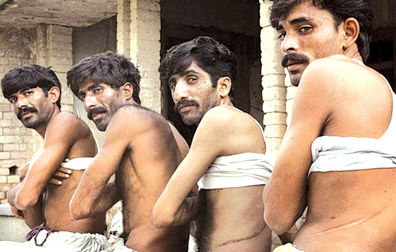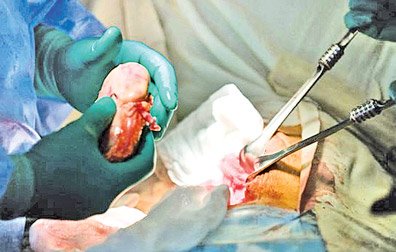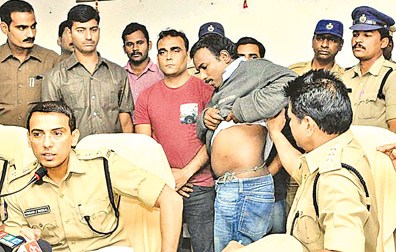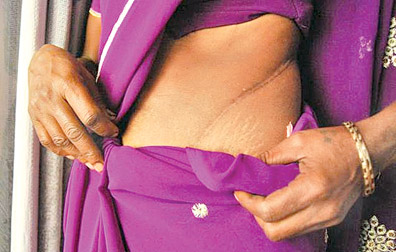Whose kidney is it?
Government appoints a three-member committee to
investigate allegations of illegal organ transplant surgeries in private
hospitals:
by Carol Aloysius
 |
|
Kidney racket thrives in
India and Sri Lanka
(southasianmedia.net) |
Following a circular banning kidney transplants on foreign nationals,
the Health Ministry appointed a three- member Committee to inquire into
the alleged illegal organ transplantation on foreign nationals allegedly
arranged by some private Lankan hospitals with the connivance of foreign
patients.
At least four local private hospitals in Sri Lanka have been accused
by the Indian media for allegedly arranging to transplant kidneys on
Indian patients who had paid or forced donors prior to their arrival for
the operation in Sri Lanka.
The sale and use of any compulsion for human organs is strictly
forbidden in Sri Lanka and in India, under the law.
Cabinet spokesman and Health Minister, Dr Rajitha Seneratne,
addressing a media briefing at the Information Department on Thursday
said, following a complaint from the Indian police, warning Sri Lankan
authorities of the alleged racket a special committee has been set up to
inquire and investigate the matter and submit a comprehensive report in
a week. He said if any local doctors were involved in such illegal
activities, they would be dealt with by the Law. He also said the Sri
Lanka Medical Council could expel them from the profession if they were
found guilty of the charges. He said the Health Services Director
General had been instructed to obtain all information with relevant
details on the matter from his Indian counterpart and submit a report to
the Health Minister.
Chairman, Private Health Services Regulatory Council and Director
General Health Services, Dr P. G. Maheepala, said in a hurried interview
with the Sunday Observer, there was a temporary ban on organ
transplantations on all foreign nationals in Sri Lankan health
facilities. He said the ban would continue till the three-member
Committee handed in their report after personally visiting the hospitals
under scrutiny and gathering comprehensive details in an independent and
unbiased manner to verify if such charges were true or not.
Temporary measure
 |
| (cdn.ruvr.ru) |
 |
| An Indian police officer
produces an accused in a recent kidney racket (Hindu) |
 |
This woman from Bangalore
is a kidney donor for money
(The HIndu) |
Director, Private Health Development Sector, Dr Kanthi Ariyaratne
endorsed these sentiments. Speaking as a member of the newly set up
Committee, she reiterated that the ban on transplants on foreign
nationals in Sri Lanka was only a temporary measure and would be lifted
once the local report had been handed and the report of the Indian
authorities received by the Ministry. Dr Ariyaratne said the committee
would visit the hospitals under investigation, "to establish the
genuineness of the relationship with the donor and the recipient". Other
members of the Committee comprise the Provincial Health Services Western
Province Director and Deputy Director General Investigation.
Health sources meanwhile admitted that proving an authentic donor
-recipient link in the case of foreign nationals was not an easy task.
"We have to rely on statements and documents which the donors and donees
bring here. How do we know if they are really genuine or fraudulently
obtained?" a health Ministry source queried.
How indeed, is the question that the Government Medical Officers
Association seems to be mulling.
GMOA spokesman Dr Navin de Zoysa said there were several ethical
issues regarding this thorny issue raised.
"Human tissue transplantation is a complex procedure. Whether the
donor is a live person or a human cadaver, it poses ethical questions.
Now that more people are demanding these life saving operations makes
this issue still more complex and difficult to resolve at once," he
said.
So does he see a solution at the end? Who should take the lead of
finding one?
According to him, the first step must come from the government and
the Ministry of Health. But before that the first action to be taken
should be to sort out the current on going issue and clear the hot air
grimed by the soot of dubious statements, rumours and the cloud of
suspicion hanging over the heads of the local doctors supposedly
involved in the racket.
He said the Indian press had said there were some Sri Lankan doctors
found in India who were allegedly involved in the racket. " First we
have to sort out this matter and see if the charges are true. If they (
the doctors) have done something wrong and engaged in an illegal
activity, they must be punished.
But the investigations must be transparent and carried out in an
independent manner. The GMOA will fully co-operate with the Health
Ministry in any investigation on this matter," he said.
Reform the existing law
He said it was important to reform the existing law on Human Tissue
Transplantation and create new protocol and guidelines as well as update
them in order to bring them in line with the present surge in transplant
demand. "The law needs to be strengthened," he added.
Health officials meanwhile told the Sunday Observer, the matter of
reforming and strengthening the present archaic law was now being taken
up as a priority issue. We had already identified areas for amending the
law a few years ago. But now we are re-visiting them and giving specific
attention to human organ transplantation since it had become the burning
issue of the day:, unnamed officials said.
Sources at a private leading hospital in Colombo explaining the
procedure involved in human organ transplants, said that when a patient
required a transplant he/she would have to find a donor " Almost all our
patients are local. The donors are either close relatives siblings,
parents , uncles aunts etc) or close associates of the family who have
offered their kidney on a voluntary basis after the tissue has been
matched. So we have no problems, The problem rises only if a donor is
un-related to the donee. Then the hospital undertaking such operations
will be under pressure to find out whether the donor had come to a
financial arrangement with the donee before hand or was forced into
agreeing to the donation. The fact that most of these patients come with
various documents to prove their claims makes it difficult for the
hospital authorities to find out the real truth".
Asked if there were Ethical Committees in private hospitals in Sri
Lanka, they said a few hospitals may have them but there was no general
rule on this.
Health Ministry sources also confirmed this. So how were the
investigations in India progressing?
Indian High Commission Information Officer Ms Esha Srivastava when
contacted said "We are unable to make any official comment as
investigations are still on going". |

